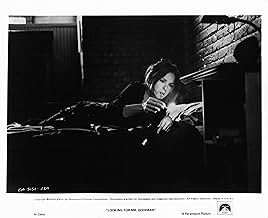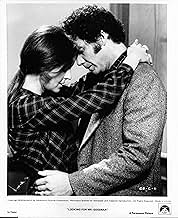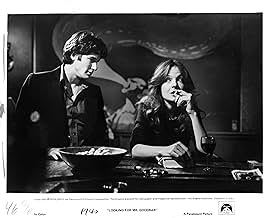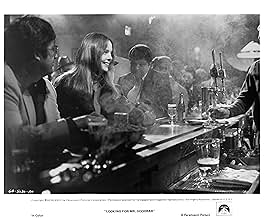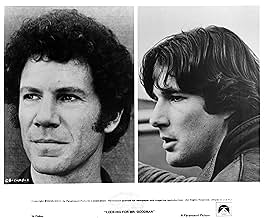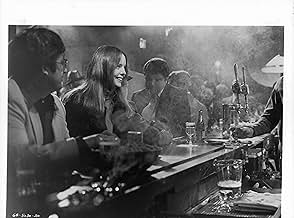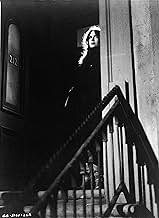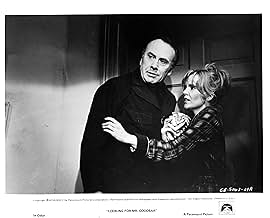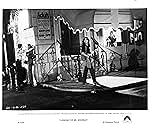VALUTAZIONE IMDb
6,7/10
9343
LA TUA VALUTAZIONE
Una dedita insegnante trascorre le sue notti girando per bar, alla ricerca di uomini violenti con i quali può impegnarsi in rapporti sessuali progressivamente violenti.Una dedita insegnante trascorre le sue notti girando per bar, alla ricerca di uomini violenti con i quali può impegnarsi in rapporti sessuali progressivamente violenti.Una dedita insegnante trascorre le sue notti girando per bar, alla ricerca di uomini violenti con i quali può impegnarsi in rapporti sessuali progressivamente violenti.
- Regia
- Sceneggiatura
- Star
- Candidato a 2 Oscar
- 1 vittoria e 6 candidature totali
Recensioni in evidenza
10t2kt2k
My wife has recently came across of a used vinyl somewhere titled "LOOKING FOR MR GOODBAR" MOTION PICTURE SOUNDTRACK and after noticed Diana Ross is listed she bought it for me for the price of... only $1!!! Despite it's almost 30 years old there are no scratches, excellent quality, sounds like new - unbelievable lucky, isn't she? :)
So here are the tracks:
Side 1 1. Theme from "LOOKING FOR MR GOODBAR" (Don't Ask To Stay Until Tomorrow) 1:16 2. Don't Leave Me This Way - Thelma Houston 3:37 3. Lowdown - Boz Scaggs 3:19 4. Machine Gun - Commodores 2:45 5. Love Hangover - Diana Ross 3:47 6. She Wants To (Get On Down) - Bill Withers 3:15 7. Theme from "LOOKING FOR MR GOODBAR" (Don't Ask To Stay Until Tomorrow) (Reprise) 2:24
Side 2 1. Theme from "LOOKING FOR MR GOODBAR" (Don't Ask To Stay Until Tomorrow) (Vocal) - Marlena Shaw 4:08 2. She's Lonely - Bill Withers 5:04 3. Try Me I Know We Can Make It - Donna Summers 4:14 4. Back Stabbers - The O'Jays 3:06 5. Prelude To Love - Donna Summer 6. Could It Be Magic - Donna Summer 6:12
PS: there's no time printed for 2/5 - in fact there's no such track present on the disc but it's listed on the label.
So here are the tracks:
Side 1 1. Theme from "LOOKING FOR MR GOODBAR" (Don't Ask To Stay Until Tomorrow) 1:16 2. Don't Leave Me This Way - Thelma Houston 3:37 3. Lowdown - Boz Scaggs 3:19 4. Machine Gun - Commodores 2:45 5. Love Hangover - Diana Ross 3:47 6. She Wants To (Get On Down) - Bill Withers 3:15 7. Theme from "LOOKING FOR MR GOODBAR" (Don't Ask To Stay Until Tomorrow) (Reprise) 2:24
Side 2 1. Theme from "LOOKING FOR MR GOODBAR" (Don't Ask To Stay Until Tomorrow) (Vocal) - Marlena Shaw 4:08 2. She's Lonely - Bill Withers 5:04 3. Try Me I Know We Can Make It - Donna Summers 4:14 4. Back Stabbers - The O'Jays 3:06 5. Prelude To Love - Donna Summer 6. Could It Be Magic - Donna Summer 6:12
PS: there's no time printed for 2/5 - in fact there's no such track present on the disc but it's listed on the label.
It was searching for a copy of this that led me to a source of otherwise unavailable films but the lengthy running time has put me off watching it, for some time. Also, I cannot now remember what got me intrigued by the title anyway. In any event the thing is now watched. It seems to me there is a bit too much of everything here, certainly Richard Gere and Tuesday Weld who are well over the top. Keaton is fine but her character begins to irritate halfway through, what with all her neediness and simultaneously thrusting of people aside, her wonderfully virtuous deaf classes, adding nothing whatsoever and the growing tedium of the shadowy scenes of sex and drugs. Brave of Keaton to take the role but if only Brooks could have kept it to something more like 90 minutes we would surely have had a much more succinct and effective movie. Too many characters to little effect and too many downers and not enough uppers.
Looking For Mr. Goodbar isn't exactly the kind of feel good movie you might want to pop in on a rainy Sunday afternoon. It's heavy - almost suffocatingly so at times. What it does offer is a great chance for Diane Keaton to play a very different kind of character. Her Theresa is nothing like her Annie Hall or Nina Banks and that's refreshing to see. It's also an excellent time capsule of New York City life in the 70's.
With an upbeat 70's disco soundtrack (odds are, you'll know most of the tunes), Looking For Mr. Goodbar tracks a schoolteacher looking for love, passion, and satisfaction anyway she can find it. Sometimes it leads to heartbreak, sometimes it leads to danger, but it always leads to depression for the audience.
It's been a long time since I've seen a film this aggressively depressing and cynical and, to be honest, it's hard for me to process. On one hand, Keaton's work is exceptional, but on the other hand, it's a pretty tough slog to sit through. One needs to be in the right frame of mind to make it through.
With an upbeat 70's disco soundtrack (odds are, you'll know most of the tunes), Looking For Mr. Goodbar tracks a schoolteacher looking for love, passion, and satisfaction anyway she can find it. Sometimes it leads to heartbreak, sometimes it leads to danger, but it always leads to depression for the audience.
It's been a long time since I've seen a film this aggressively depressing and cynical and, to be honest, it's hard for me to process. On one hand, Keaton's work is exceptional, but on the other hand, it's a pretty tough slog to sit through. One needs to be in the right frame of mind to make it through.
This was an interesting movie and it shows how the world has changed in the last 30 years. The attitudes (between men and women, gays and straights), the language used back then, the social atmosphere (bar scene) of the late 1970s, even the financial differences--she's able to afford an apartment in Manhattan on a teachers salary! (even though it has roaches this still isn't possible in 2006). All of these things made the movie interesting for me. I also imagine it must have been a very shocking movie back then. I was 8 years old when it came out so I didn't see it in the theater but I would have liked to see it in a theater just to see how people took it back then. I would have liked to walk out of the theater and hear the conversations going on as people walked to their cars. Did people like it back then? Did they think it was shocking? Did they think it accurately portrayed a type of person they maybe knew or were themselves back then? Also, Diane Keaton was very good in it and it's very interesting to see a young Richard Gere and Tom Berenger when their careers were just beginning.
Few viewers can deny the impact of this film on the '77 crowd and generations afterwards. As a curious 8-year-old up late watching HBO, I never forgot the story or the lesson. Based on a true story, Richard Brooks astutely translated Judith Rossner's best-selling novel to screen, choosing a luminous Diane Keaton, hot off `Annie Hall' and `The Godfather' to play Theresa Dunn, an up-and-coming Richard Gere, a quirky Tuesday Weld , and amazing Richard Kiley as Dunn, the overbearing Irish-Catholic father. The misogynistic Richard Atherton and an ominous Tom Berenger rounds out the solid cast.
Neither traditionally beautiful like her stewardess sister, Katherine or a baby factory like her other sister living at home with her, Theresa is the odd one out, the sister who is searching for approval from a father who barely acknowledges her existence. Childhood traumas mold her and make the fact that Theresa allows herself to be strong and fallible all the more powerful and endearing.
Tired of her father's unyielding rule, Theresa moves into the apartment building owned by Katherine's next attempt at a husband. As the women's freedom movement is underway, Theresa is caught in the position of questioning the traditional roles for women, roles against a new woman in control of her body and her sexuality. By day she teaches at a school for the deaf. By night her nightly jaunts into New York's seamier nightlife scene, expose the dichotomy of being a professional woman by day who must maintain credibility and responsibility, especially with young children while trying to be sexually active, experimental and suffering the stigma attached to both as whore and as a free woman wanting purely physical experiences much the same as men, yet realizing the label is different.
Throughout this film, Brooks explores Theresa's perpetual search for acceptance by men but a need to maintain her own identity. From a failed affair with a Prof. she was a TA to, to her fling with Tony, a local hustler, Theresa is perpetually in question of her sexuality and her allure for men, making poor choices in her partners only to endure their violence and possessiveness - much like her father. That she meets up with a homicidal drifter the New Year's Eve night she has decided to quit drugs and cruising, is the irony of her self-discovery.
The only positive male in her life appears to be is LaVar Burton's character, Cap Jackson, the sullen brother of one of Theresa's students. He is the only male presence in the movie that is not malevolent or trying to extract something from Theresa and during her altercation with Tony at the school, he is the only person to defend and protect her.
While the scare of AIDS stole later generations' promiscuity, this tale still resonates for viewers, especially for women on their own, looking for intimacy yet craving isolation.
While the ending tends to drag with one too many drug scenes the movie still packs a wallop for a finale.
Neither traditionally beautiful like her stewardess sister, Katherine or a baby factory like her other sister living at home with her, Theresa is the odd one out, the sister who is searching for approval from a father who barely acknowledges her existence. Childhood traumas mold her and make the fact that Theresa allows herself to be strong and fallible all the more powerful and endearing.
Tired of her father's unyielding rule, Theresa moves into the apartment building owned by Katherine's next attempt at a husband. As the women's freedom movement is underway, Theresa is caught in the position of questioning the traditional roles for women, roles against a new woman in control of her body and her sexuality. By day she teaches at a school for the deaf. By night her nightly jaunts into New York's seamier nightlife scene, expose the dichotomy of being a professional woman by day who must maintain credibility and responsibility, especially with young children while trying to be sexually active, experimental and suffering the stigma attached to both as whore and as a free woman wanting purely physical experiences much the same as men, yet realizing the label is different.
Throughout this film, Brooks explores Theresa's perpetual search for acceptance by men but a need to maintain her own identity. From a failed affair with a Prof. she was a TA to, to her fling with Tony, a local hustler, Theresa is perpetually in question of her sexuality and her allure for men, making poor choices in her partners only to endure their violence and possessiveness - much like her father. That she meets up with a homicidal drifter the New Year's Eve night she has decided to quit drugs and cruising, is the irony of her self-discovery.
The only positive male in her life appears to be is LaVar Burton's character, Cap Jackson, the sullen brother of one of Theresa's students. He is the only male presence in the movie that is not malevolent or trying to extract something from Theresa and during her altercation with Tony at the school, he is the only person to defend and protect her.
While the scare of AIDS stole later generations' promiscuity, this tale still resonates for viewers, especially for women on their own, looking for intimacy yet craving isolation.
While the ending tends to drag with one too many drug scenes the movie still packs a wallop for a finale.
Lo sapevi?
- QuizTom Berenger admitted in an interview that he had nightmares after he was finished shooting all of his scenes as Gary.
- BlooperTheresa is supposed to be a first-grade teacher, but all her students look to be way older. The youngest seem to be 9 or 10 while the oldest could be 12, 13 or even older.
- Curiosità sui creditiThe Paramount logo is shortened at both ends, fading in at the point the text already appears. It was gray-scaled in the closing version.
- ConnessioniFeatured in Sex, Censorship and the Silver Screen: Forward Into the Past (1996)
- Colonne sonoreTry Me, I Know We Can Make It
Written by Donna Summer (uncredited), Giorgio Moroder (uncredited) and Pete Bellotte (uncredited)
Performed by Donna Summer
Courtesy of Casablanca Record & FilmWorks
I più visti
Accedi per valutare e creare un elenco di titoli salvati per ottenere consigli personalizzati
- How long is Looking for Mr. Goodbar?Powered by Alexa
Dettagli
Botteghino
- Lordo Stati Uniti e Canada
- 22.512.655 USD
- Fine settimana di apertura Stati Uniti e Canada
- 1.540.635 USD
- 23 ott 1977
- Lordo in tutto il mondo
- 22.513.584 USD
- Tempo di esecuzione
- 2h 16min(136 min)
- Mix di suoni
- Proporzioni
- 1.85 : 1
Contribuisci a questa pagina
Suggerisci una modifica o aggiungi i contenuti mancanti


